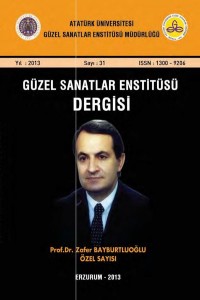Abstract
Worldwide, social transformations of the post 1960s and short-lived “thaw” period in the Soviets gave birth to Russian avant-garde, nonconformism. Leningrad (today Saint Petersburg) and Moscow were the venues where the resistance of the artists with illegal exhibitions took place as reactionary demonstrations against the increasing interventions and persecutions following the end of “thaw” period. In the second half of the 20th century, non-conformist artists of the second generation, Russian avantgardism who constantly sought new forms of expressions and pursued the ways of comportment with contemporary art formed a commonality regarding their work theme which can be outlined as the existential misery of human being. Resistance of the groups of the non-conformist artists who were closely watched by the Soviet administration and significant works of some key names among them made a big impact in this period. Here, non-political artistic activities (focused on art itself rather than anything else) of the nonconformist artists of the Leningrad will be the main concern of the study. Additionally, artists who got deported or forced and threatened to leave their country will be mentioned in detail.
Keywords
References
- Batur, B. (2002). Modernizmin Serüveni, YKY Sanat, İstanbul.
- Yılmaz, M. ( 2006). Modernizmden Postmodernizme Sanat, Ankara.
- X ЛОБЫСТИН,Aндрей, Kpa ткий K урс Истоpии Нонkoмфopмизмa.Поиск@Маil.Ru http://go.mail.ru/ (Eri şim 02012
- ГЛЕЗЕР,Александр, Русская Mысль, Cентябрь 1976 Поиск@Маil.Ru http://go.mail.ru/ (Eri şim 02.2012)
- ГЛЕЗЕР, Александр, К 35-летию «бульдозерной» выставки. Интервью. Поиск@Маil.Ru http://go.mail.ru/.(erişim:03.05.2012)
- Социокультурная C итуация 60—70Х годов ХX-века в России. Поиск@Маil.Ru http://go.mail.ru/ (Erişim 15.02.2012) ГУРЕВИЧ,Л,«Ленинградский Андерграунд. Начало», Ленинград, 1990,. Поиск@Маil.Ru http://go.mail.ru/ (Erişme 17.05.2012)
- ОРЛОВ,Евгений, Музей Нонкомформистского Искусства. Поиск@Маil.Ru http://go.mail.ru/ (Erişme 25.05.2012)
- Национальная Политика Cоветского Государства. Поиск@Маil.Ru http://go.mail.ru/(Eri şim 02.2012)
- K онец Oттепели и Yсиление Kонсервативных Tенденций в Pykoводстве Ky лтурной Жизнью. Поиск@Маil.Ru http://go.mail.ru/(Erişim 02012) "
- ЗЕРКАЛО" – ЛИТЕРАТУРНО-ХУДОЖЕСТВЕННЫЙ ЖУРНАЛ, Российская культура от Второго Pусского Aвангарда до Cовременных D остижений в Прозе,Поэзии,Эссеистике и Изобразительных Искусствах. Издается в Израиле (Тель-Авив), Главный редактор: Ирина Врубель-Голубкина, E-mail:exprocom@gmail.com (Erişim 02012)
- ЩЕРБАКОВА,Ирина, Искусство и Пропаганда. 22/05/2009. Поиск@Маil.Ru http://go.mail.ru/:(Eerişim 10.07.2012)
Abstract
1960 sonrası dünya çapında yaşanan dönüşümler ve Sovyetler
Birliği’nin geçirdiği kısa süreli “Yumuşama” dönemi, ikinci kuşak Rus
avangart, non-konformizmini ortaya çıkarmıştır. “Yumuşama” döneminin
sona erip müdahale ve takiplerin artması, sanatçıların buna karşı direnci,
izinsiz yapılan sergi-eylemler yoğunlukla Leningrad (şimdiki Saint
Petersburg) ve Moskova şehirlerinde gerçekleşmiştir. 20.Yüzyılın ikinci
yarısında dünya sanatına uyum sağlamağa çalışan ve yapıtlarında durmadan
yeni ifade biçimleri arayan ikinci kuşak Rus avangardizminin nonkonformist
sanatçıları, insanın varoluşsal perişanlığı teması üzerinde
birleşmişlerdir. Sovyet yönetimi tarafından yakından takip edilen nonkonformist
sanatçı gruplarının direniş mücadelesi ve bazı kilit sanatçıların
eserleri bu döneme damgasını vurmuştur. Bu makalede, özellikle politikadan
uzak, sadece sanatla ilgilenen Leningrad non-konformistlerinin faaliyetleri
araştırmanın özünü oluşturuyor. Aynı zamanda sınır dışı edilen, baskı ve
tehditler yüzünden ülkelerini terk etmek zorunda bırakılan muhacir
sanatçılardan örneklendirmeler yapılmaktadır.
Anahtar Kelimeler: SSCB, Çözülme, Leningrad, Non-konformizm,
Varoluşçuluk, Rus Avangardizmi, Sergi-eylem.
Russian Non-Comformism
Abstract
Worldwide, social transformations of the post 1960s and short-lived
“thaw” period in the Soviets gave birth to Russian avant-garde, nonconformism.
Leningrad (today Saint Petersburg) and Moscow were the
venues where the resistance of the artists with illegal exhibitions took place
as reactionary demonstrations against the increasing interventions and
persecutions following the end of “thaw” period. In the second half of the
20th century, non-conformist artists of the second generation, Russian avantgardism
who constantly sought new forms of expressions and pursued the
ways of comportment with contemporary art formed a commonality
regarding their work theme which can be outlined as the existential misery of
human being.
Resistance of the groups of the non-conformist artists who were
closely watched by the Soviet administration and significant works of some
key names among them made a big impact in this period. Here, non-political
artistic activities (focused on art itself rather than anything else) of the nonconformist
artists of the Leningrad will be the main concern of the study.
Additionally, artists who got deported or forced and threatened to leave their
country will be mentioned in detail.
Keywords: Russian, Leningrad, avant-garde, non-conformism.
Keywords
References
- Batur, B. (2002). Modernizmin Serüveni, YKY Sanat, İstanbul.
- Yılmaz, M. ( 2006). Modernizmden Postmodernizme Sanat, Ankara.
- X ЛОБЫСТИН,Aндрей, Kpa ткий K урс Истоpии Нонkoмфopмизмa.Поиск@Маil.Ru http://go.mail.ru/ (Eri şim 02012
- ГЛЕЗЕР,Александр, Русская Mысль, Cентябрь 1976 Поиск@Маil.Ru http://go.mail.ru/ (Eri şim 02.2012)
- ГЛЕЗЕР, Александр, К 35-летию «бульдозерной» выставки. Интервью. Поиск@Маil.Ru http://go.mail.ru/.(erişim:03.05.2012)
- Социокультурная C итуация 60—70Х годов ХX-века в России. Поиск@Маil.Ru http://go.mail.ru/ (Erişim 15.02.2012) ГУРЕВИЧ,Л,«Ленинградский Андерграунд. Начало», Ленинград, 1990,. Поиск@Маil.Ru http://go.mail.ru/ (Erişme 17.05.2012)
- ОРЛОВ,Евгений, Музей Нонкомформистского Искусства. Поиск@Маil.Ru http://go.mail.ru/ (Erişme 25.05.2012)
- Национальная Политика Cоветского Государства. Поиск@Маil.Ru http://go.mail.ru/(Eri şim 02.2012)
- K онец Oттепели и Yсиление Kонсервативных Tенденций в Pykoводстве Ky лтурной Жизнью. Поиск@Маil.Ru http://go.mail.ru/(Erişim 02012) "
- ЗЕРКАЛО" – ЛИТЕРАТУРНО-ХУДОЖЕСТВЕННЫЙ ЖУРНАЛ, Российская культура от Второго Pусского Aвангарда до Cовременных D остижений в Прозе,Поэзии,Эссеистике и Изобразительных Искусствах. Издается в Израиле (Тель-Авив), Главный редактор: Ирина Врубель-Голубкина, E-mail:exprocom@gmail.com (Erişim 02012)
- ЩЕРБАКОВА,Ирина, Искусство и Пропаганда. 22/05/2009. Поиск@Маil.Ru http://go.mail.ru/:(Eerişim 10.07.2012)
Details
| Primary Language | tr;en |
|---|---|
| Journal Section | Articles |
| Authors | |
| Publication Date | May 2, 2014 |
| Submission Date | May 2, 2014 |
| Published in Issue | Year 2013 Issue: 31 |
Obtaining permissions for studies requiring ethics committee approval regarding the implementation of ethical rules and including information about permission in the article was added to the criteria. In this direction, Ethics Committee Permission is required for articles submitted to our journal and meeting the conditions stated below.
• Any research conducted with qualitative or quantitative approaches that require data collection from participants using questionnaires, interviews, focus group work, observation, experimentation, and interview techniques.
Also;
• Obtaining and indicating permission from the owners for the use of scales, surveys and photographs belonging to others,
• It should be stated that the copyright regulations are complied with for the intellectual and artistic works used.


